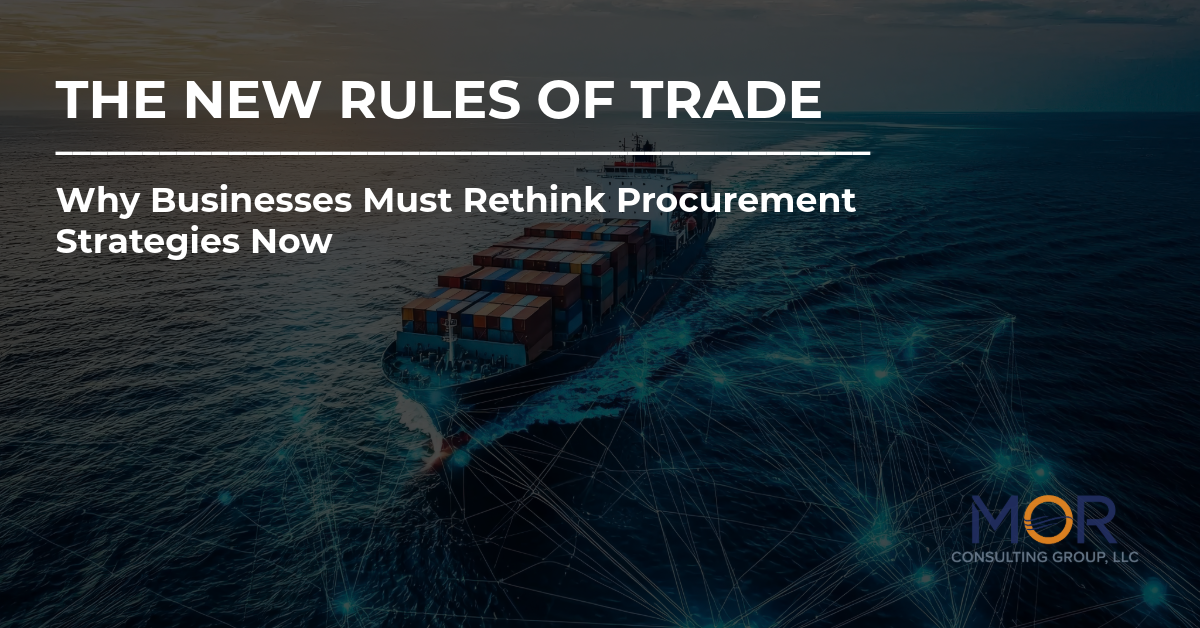The New Trade Reality: Why Procurement Strategy Can’t Be an Afterthought
Many businesses only evaluate procurement strategies during economic downturns - a critical oversight. The U.S. has historically been Canada’s closest ally and trade partner. According to Export Development Canada (EDC), trade between the two nations exceeded CAD $1.3 trillion in 2023, with $3.5 billion worth of goods and services crossing the border daily. However, recent geopolitical shifts - including newly imposed and escalating tariffs - have disrupted this longstanding relationship, highlighting the need for proactive procurement reviews rather than reactive decision-making.
Understanding Tariffs and Their Application
✔ What is a Tariff?
A tariff is a tax imposed by a government on imported goods, aimed at protecting domestic industries by making foreign products more expensive. The U.S. has recently imposed tariffs on Canadian imports, increasing costs for businesses and consumers alike.
✔ When Are Tariffs Applied?
Governments apply tariffs to shield domestic industries from foreign competition, generate revenue, or respond to perceived unfair trade practices. These measures often lead to retaliatory tariffs, creating a ripple effect across multiple industries.
The Unprecedented Nature of the Current Trade Situation
The recent trade tensions between Canada and the U.S. are unlike any in modern North American history. The scale and unpredictability of these tariffs, along with shifting trade alliances, introduce risks that businesses must take seriously. These actions have strained relations between traditionally allied nations, bringing a level of uncertainty not seen in decades.
While some businesses may assume this trade war is temporary, the reality is that supply chains and procurement strategies must be evaluated regularly - because if not tariffs, another disruption will always be on the horizon. Change is inevitable and constant.
The Risks of Ignoring Procurement Strategy in Today’s Trade Climate
Tariff Volatility:
The U.S. - Canada relationship is not as predictable as before. Sudden policy shifts can instantly increase costs or eliminate supplier viability overnight
Businesses without a contingency plan may find themselves scrambling for alternatives at higher costs
✔ Global Supply Chain Disruptions:
Geopolitical tensions between major economies like China, the U.S., and the EU create uncertainty
Many businesses are re-evaluating supply chains and shifting away from China due to political risks, cost volatility, and compliance concerns
✔ Changing Customer Landscapes:
Many companies focus on their suppliers but fail to assess their customers' exposure to trade disruptions
If your customers rely on tariff-heavy imports, they may pass on those costs to you or reduce their demand, directly impacting your revenue
✔ Regulatory & Compliance Risks:
A trade policy change could suddenly require different certifications, approvals, or restrictions on key products
Businesses that don't anticipate these changes could face unexpected compliance costs or operational delays
What Businesses Should Be Doing Right Now
✔ Analyze your revenue sources. Identify your biggest customers and assess how exposed they are to tariffs, supply chain disruptions, or economic downturns. If their costs increase due to tariffs, determine how this will impact their purchasing power - and ultimately, your revenue
✔ Evaluate your supplier network. Identify which companies you rely on for goods and services and assess their risk exposure. Determine if any of your suppliers are based in tariff-impacted regions, and establish alternative sources in neutral or stable markets
✔ Assess your procurement strategy for risk exposure. Identify whether you are overly reliant on a single country for materials or manufacturing. Map out potential compliance risks if trade policies shift, preparing for regulatory changes
✔ Run trade disruption scenarios. Model the impact of tariff increases or supplier disruptions on your bottom line. If your primary supplier faced import restrictions, determine how quickly you could pivot to a backup supplier without disrupting operations
✔ Empower and engage your employees. Be transparent with your team about how trade shifts could impact the business. Equip them with the knowledge and tools to identify risks and implement solutions proactively. Your human capital is your greatest differentiator - a well-informed team will propel your strategy into action and drive execution
Strategic Resilience Requires Action - Not Reaction
Too many businesses operate with a “wait and see” approach, assuming that trade policies will stabilize or that disruptions will be short-lived. This is a dangerous gamble. Even if the current trade war is temporary, the next disruption - whether due to tariffs, supply chain breakdowns, or geopolitical tensions - could be just around the corner.
The businesses that thrive in uncertainty aren’t the ones reacting to crises; they’re the ones that already have a strategy in place before disruptions hit.
Now Is the Time to Act
🔹 Audit your procurement strategy - before external risks force your hand
🔹 Run scenario analyses to assess tariff impacts and supply chain risks
🔹 Diversify your supplier base before you’re left scrambling
🔹 Engage with experts who understand procurement risk management
🔹 Communicate with your employees - equip them to execute effectively
In an era of trade uncertainty, companies that proactively manage risk will not only survive but gain a competitive edge over those that remain complacent. Businesses that take control of their procurement strategies now will be the ones that thrive, adapt, and lead in the face of disruption.
At MOR Consulting Group™, a 100% Canadian-owned and WBE-certified firm, we are helping businesses navigate trade uncertainty, strengthen supply chains, and develop procurement strategies that mitigate risk while driving sustainable growth. Whether you need a comprehensive risk assessment, supplier diversification strategy, or expert guidance on adapting to evolving trade policies, our team provides the strategic insights that turn challenges into competitive advantages.

